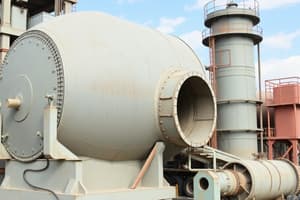Podcast
Questions and Answers
What is the primary purpose of conducting laboratory tests on Portland cement?
What is the primary purpose of conducting laboratory tests on Portland cement?
- To evaluate the cost of production
- To analyze its chemical composition
- To assess its physical properties and quality (correct)
- To determine its color and size
Which of the following is NOT a physical property of aggregates?
Which of the following is NOT a physical property of aggregates?
- Specific gravity
- Bulk density
- Thermal conductivity (correct)
- Moisture content
What does the bulking of sand refer to in the context of aggregate properties?
What does the bulking of sand refer to in the context of aggregate properties?
- The increase in volume of sand due to moisture (correct)
- The grading of sand particles based on size
- The reduction in weight of sand when wet
- The presence of impurities within the sand
Which type of cement is specifically designed for underwater construction?
Which type of cement is specifically designed for underwater construction?
Which of the following factors does NOT affect the specific gravity of aggregates?
Which of the following factors does NOT affect the specific gravity of aggregates?
Flashcards are hidden until you start studying
Study Notes
Cement: Physical Properties
- Portland cement is a hydraulic cement, meaning it sets and hardens by chemical reaction with water.
- Key physical properties that affect performance:
- Fineness: Determines the rate of hydration and strength development.
- Specific surface area: Measured using the Blaine air permeability method.
- Chemical composition: Influences the strength, setting time, and resistance to chemical attack.
- Soundness: Resistance to expansion due to internal chemical reactions.
- Setting Time: Time required for the cement paste to lose its plasticity.
Laboratory Tests on Cement
- Tests assess quality and conformity to standards.
- Setting Time: Vicat apparatus measures the initial and final setting times.
- Compressive Strength: Measured using standard test cubes after curing.
- Fineness: Blaine air permeability test or sieve analysis.
- Soundness: Le Chatelier test measures expansion due to reaction with water.
- Chemical Composition: Chemical analysis determines the proportions of various oxides.
Types of Cements
- Ordinary Portland Cement (OPC): Most common type, used in general construction.
- Rapid Hardening Cement: Sets and gains strength faster than OPC.
- Low Heat Cement: Generates less heat during hydration, suitable for large structures.
- High Alumina Cement: High strength and resistance to high temperatures.
- Sulphate Resisting Cement: Resistant to attack by sulphates, used in marine environments.
Aggregate: Classification
- Fine Aggregate: Sand, maximum size less than 4.75 mm.
- Coarse Aggregate: Gravel, crushed stone, maximum size varies based on application.
- Classification: Based on origin (natural or crushed) and gradation (size distribution).
Aggregate: Physical Properties
- Specific Gravity: Ratio of the weight of a material to the weight of an equal volume of water.
- Bulk Density: Weight of a unit volume of aggregate, including voids.
- Absorption: Ability of aggregate to absorb water.
- Moisture Content: Percentage of water in aggregate, affects its weight and volume.
- Bulking: Expansion of aggregate when wet, due to water filling voids.
Studying That Suits You
Use AI to generate personalized quizzes and flashcards to suit your learning preferences.




